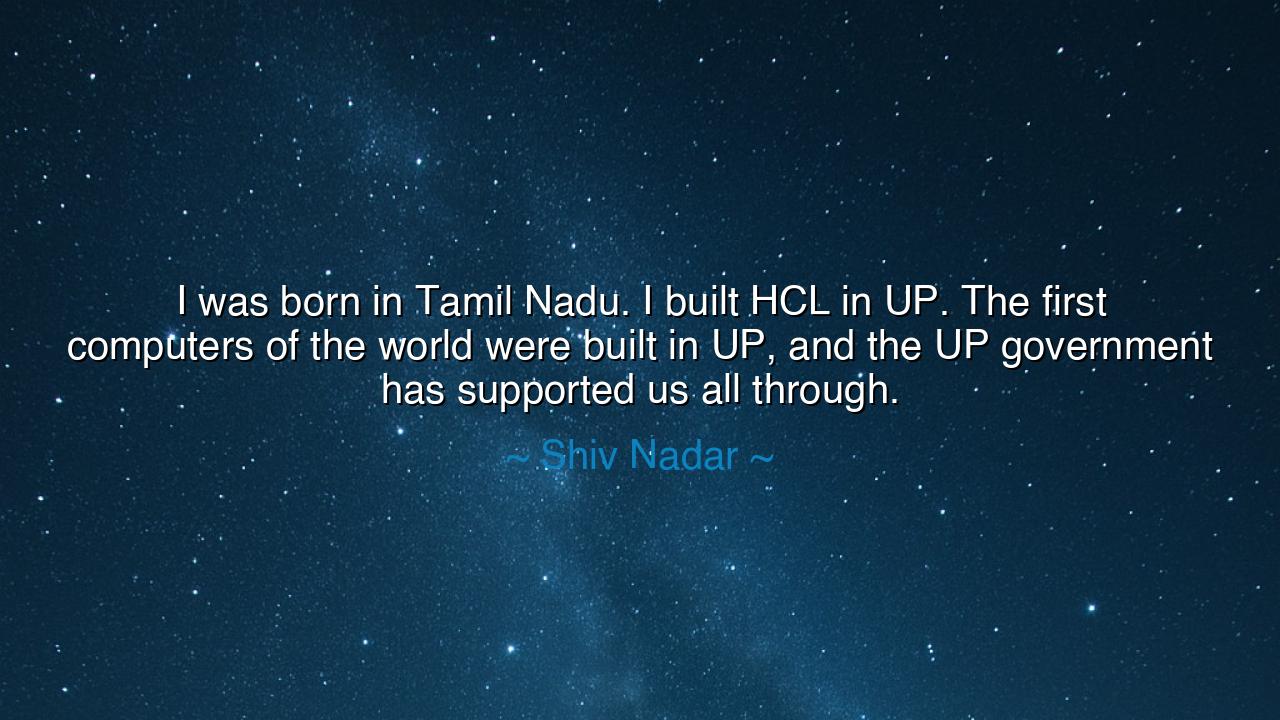
I was born in Tamil Nadu. I built HCL in UP. The first computers
I was born in Tamil Nadu. I built HCL in UP. The first computers of the world were built in UP, and the UP government has supported us all through.






In the proud and reflective words of Shiv Nadar, founder of HCL and one of the visionaries of India’s technological awakening, we hear a declaration both personal and national: “I was born in Tamil Nadu. I built HCL in UP. The first computers of the world were built in UP, and the UP government has supported us all through.” These words carry not only the weight of a man’s journey but also the pulse of a nation in transformation — a tale of roots, resilience, and the boundless spirit of creation that bridges regions, languages, and generations.
To say “I was born in Tamil Nadu” is to honor the soil that nurtured his beginning — a land of wisdom, art, and ancient learning. It is the birthplace of thinkers, poets, and teachers whose light has guided India for centuries. Yet Shiv Nadar did not confine his dreams within the boundaries of his origin. He looked beyond — to Uttar Pradesh, the land of rivers and revolutions, where civilizations had risen and fallen, where the first words of India’s modern destiny were written. There, he planted the seeds of HCL, one of India’s earliest and most enduring technology empires. It was in the heart of UP that he transformed vision into structure, and structure into legacy.
His statement that “the first computers of the world were built in UP” is more than a claim of innovation — it is a remembrance of a proud dawn. When HCL emerged in the 1970s, India was still bound by limitations, its technological landscape barren, its future uncertain. Yet in those humble beginnings, within modest rooms and with limited resources, Shiv Nadar and his companions created something monumental — a revolution in computation, born not in the industrial West, but in the spiritual heartland of India. Their work was a triumph of intellect over infrastructure, of courage over constraint.
In this, there echoes the ancient rhythm of human achievement: that greatness is not born of privilege, but of purpose. Like Chanakya, who once guided an empire from humble beginnings, or Aryabhata, who charted the stars from the banks of the Ganges, Nadar too proved that geography cannot bind genius. His work in UP became a testament that the unity of India’s spirit — the meeting of southern intellect and northern opportunity — could create miracles. It was not just a merging of technology and business, but of cultures, values, and dreams.
And yet, Nadar’s words also carry gratitude — for he says, “the UP government has supported us all through.” In that simple acknowledgment lies the recognition that no vision stands alone. Even the most brilliant flame requires air to burn. Progress, he reminds us, is not the work of one man, but of many — of governments that nurture enterprise, of teams that share burdens, of people who believe when others doubt. His gratitude is not weakness; it is strength — the humility of one who knows that success is a shared inheritance.
From this truth, a powerful lesson unfolds: roots matter, but wings matter more. Where you are born does not determine what you can build; what matters is the courage to carry your heritage into the wider world. Shiv Nadar’s journey from the serene coasts of Tamil Nadu to the industrial heart of Uttar Pradesh mirrors the journey every seeker must take — from comfort to challenge, from knowing to creating. In his life, we see the living spirit of India itself — diverse, dynamic, and ever-reaching toward the future.
Let us then learn from this story: to honor our beginnings, but not be bound by them. To seek purpose beyond place. To believe that greatness can be born from any soil that welcomes effort and vision. For the union of heritage and innovation is the mightiest force in civilization. Just as Shiv Nadar built bridges between regions and transformed ideas into enterprise, so too must we build — not only machines, but understanding; not only wealth, but wisdom; not only success, but significance.
In the end, his quote is a call to every dreamer of this generation and the next: that India’s strength lies not in its divisions, but in its unity of spirit — in the shared pursuit of excellence across its vast and sacred land. From the temples of Tamil Nadu to the plains of Uttar Pradesh, the message rings clear: creation knows no borders, and destiny belongs to those who dare to build.






AAdministratorAdministrator
Welcome, honored guests. Please leave a comment, we will respond soon